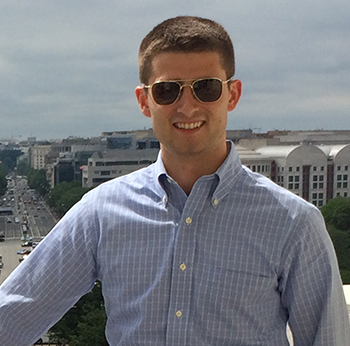
David Cook
Growing up, David Cook heard tales of his grandfather’s time in the service during World War II -- particularly how he had helped liberate Buchenwald, a Nazi concentration camp in Germany.
Though his grandfather passed away in 2001, this past semester, Cook had the opportunity to dive deeper into his story and World War II in his “History of the Holocaust” course taught by Professor Adam R. Seipp, USC Shoah Foundation’s first-ever Texas A&M Teaching Fellow.
“I took the class mainly just to learn more, kind of for selfish reasons, about what my grandfather was involved in during the war,” Cook said. “But also I’m just intrigued at any catastrophe like this where you’re wondering, ‘How does this go down?’”
After taking the course in the fall semester, Cook had another opportunity to interact with the subject matter earlier this month, when he served on a panel of students who spoke at the university’s Hillel for a discussion on “Testimony, Memory and the Holocaust.” The panel followed a presentation by USC Shoah Foundation Center for Advanced Genocide Research Director Wolf Gruner and Visual History Archive Curator Crispin Brooks.
Cook spoke about the experience he gained with the Visual History Archive in his class. All students in the course were put into groups that were assigned a project on a certain aspect of the death marches from the Dachau concentration camp. To complete the project, Cook and his classmates watched 19 testimonies from the VHA that Seipp had selected.
“The VHA adds that extra dimension on the learning about the Holocaust that you don’t get just by watching some film on it or hearing your professor lecture,” he said. “It’s completely different hearing the testimonies, so I spoke about [during the panel] the human aspect the VHA added.”
Cook said what the VHA added would likely not have been possible just in the lecture course.
“I know I will probably never think the same way after taking the class.”
“In class you don’t have time to go over everything; it’s hard to teach first-hand experiences without stopping class and making kids watch the videos,” he said. “So it was good for us to get the chance to work on this research project and have to go in and navigate it ourselves.”
The course also led to a special experience for Cook. While doing research on the topic, he came across a half hour video his grandfather had recorded for the United States Holocaust Memorial Museum that no one in his family knew about.
“It was a pretty special event for me,” he said. “My grandmother’s still alive, so she’s just so happy to have found that.”
It’s this kind of video testimony that Cook says has had a huge impact on him.
“Watching someone speak about their experience in the camp will change your perspective on it forever,” he said. “I know I will probably never think the same way after taking the class.”